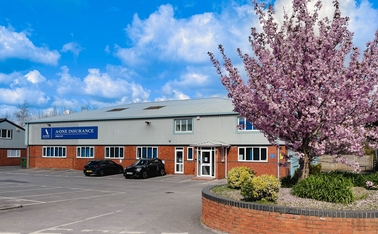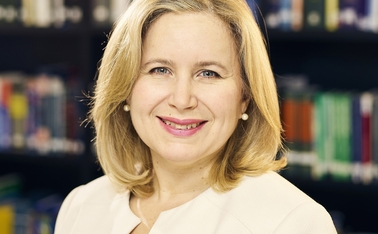
Broking Success: Strength in Scotland

Director Tom Yorke recounts his route from Giles to investing in Blue Rock Insurance Brokers, growing organically and competing on quality with the ethos of not doing speculative quotes as well as the opportunities for the Scottish broker as it targets doubling in the next five years
Blue Rock
GWP: £5m
Specialisms: Licensed trade, manufacturing and haulage
Staff: 12
Locations: Ayr, Bellshill
How did you come to invest in Blue Rock?
I had joined an existing small firm in Ayr in 2007, which was both financial services and general insurance run by Brian Murphy, with a view to buying it out. I became a partner in 2010. Prior to the buyout John McQuaid joined [in 2012] – he was the local Gallagher branch manager – and we bought Murphy Insurance in 2015. We just took the GI book, which was about £1m in size, and we changed the name to Blue Rock in 2018 (see box, below).
How did you start in insurance?
I started as a YTS at Giles Insurance Brokers in Ayr. That was 1987 and I was 17. There was only the Ayr and Irvine offices at that stage. I was basically doing the filing, writing cover notes and going to the post office with big bags of mail. I joined the commercial lines department when I was 19. I went down to Birmingham in 1997 and we opened up what was the first English branch of Giles Insurance.
What was the thinking behind the rebrand?
Deciding to do it was the easy part, coming up with the name was difficult. Both John McQuaid and I have spent our lives getting our surnames misspelt so we thought nobody is ever going to find that website. I Googled myself ill a couple of times trying to come up with something. It was eventually something that my Dad said to me that led me on Blue Rock.
You can see from the coast here Ailsa Craig, a well-known little round shaped island. That’s where they get all the blue and green granite for the curling stones. But I actually came up with the name before we made the connection. The little rock in our logo is part of a profile of Aisla Craig.
What was it like working through the boom period of striking deals?
I really enjoyed it. I got to start up an office at the age of 27 from scratch, I was in Birmingham looking for acquisitions and speaking to guys that were thinking about retiring. Chris was a great guy to work for, a great motivator of people. As it grew and the layers of management and ownership started to change it became clear to me that I didn’t really want to work for a big organisation. I much prefer that smaller, faster moving more dynamic environment which is why I eventually jumped ship a few years before the Gallagher’s buyout.
What happened next?
Brian Murphy was looking to sell to Broker Network and he wanted a branch manager. I said I don’t really want to be a branch manager but I would be interested in talking about buying.
We got into quite a long, drawn-out conversation and eventually agreed we would do it. It was a bit of punt as I had absolutely no money and Brian knew it, but we worked out how we would do it. We developed quite a bit of trust between us.
How did you generate the funding in the build up to 2015?
It was too small a deal for private equity to be the slightest bit interested in. It was personal funds. From me a mix of remortaging my house and my wife had a house that she sold. The buyout deal was cash and a bit of bank lending from the Clydesdale Bank and loan notes for Brian Murphy. We [Yorke and fellow director McQuaid] got Brian’s money back to him as quickly as we could. We had all that debt repaid by 2019 before the pandemic hit.
How is the management split now?
In 2015, we were both account execs with similar sized accounts. We both still have accounts, but we have other execs working for us. I tend to be more on the financial and operational stuff and John is more on the sales director kind of kind role. We’re both 50-50 [shareholders].
How did you grow from £1m to £5m?
John started at Giles on the YTS a couple of years after me so we’ve known each other for a long, long time. We’ve always had the same kind of view that there was something not quite right about the insurance buying process. How it was sold and the communication of what people are actually buying. We always thought there was far too much responsibility on customers.
I don’t mean that’s terrible people doing that to customers. It’s just sort of group think that the industry has. We’d always thought there was a different way. One of the big things that we said was we were going to do a lot more work with customers, interrogating policy wordings, on checking policy conditions and actually verifying that the client is aware of them and complies with them.
What you need to do that is time. We decided we would stop doing quotes. We effectively adopted that as almost a bit of a slogan. Obviously we have to tell people much the insurance is going to cost. It’s not a speculative quote model.
What is local competition like?
All of our clients are getting phone calls and emails and other people’s clients are getting phone calls and emails from us. Insurance is almost a perfect market from that competitive point of view because there’s lots and lots of potential suppliers. Competition is fierce.
So how do you compete?
It’s not competing on price because actually price isn’t the difficult part. What we we’ve tried to compete on is quality. We thought we need to get off this hamster reel doing all this work for free. For insurance brokers the quote is not an estimate to do work. It’s the result of having done the work. Lots of people said we were nuts and if you want to grow a business you need to do more quotes.
So how do you get new business?
What we do is more of a quality review. Based on the policies that they’ve currently got we let them see what the difference would be if we were dealing with them as their broker. When we do those reviews, we always say to people if you’re with a decent insurance company, if the price is about where it should be and there’s nothing wrong with the program, then we we’ll just hand it back. I’m not adding anything if that’s the case. But actually there’s very few that we hand back because we do find problems.
We would like to do that [review] away from renewal and in really forensic detail.
It’s quite a lot of word-of-mouth recommendation and our own marketing, getting out there and telling people what we do.
Is that why on your website you flag that you do so many visits?
Yes. A lot of that needs to be done. We also have our own way of trying to get a lot more of this in front small or remote customers that we don’t go and see. We have an agenda that will follow.
If we are going, we see what’s happening because that’s helping the customer. The first part of the communication is lacking [in the industry] and the verification’s definitely missing.
What does your in-house claims service add to your proposition?
We’ve always had somebody dedicated to claims. It requires a certain skillset, it benefits from experience and relationships. Rather than everybody doing bits and pieces and dipping in and out you have someone who has focus in that very important area, we’ve always seen that to be hugely valuable. Having said that if there’s a major claim with one of my clients I am going to get involved and be there on the ground..
Where are your clients?
The majority are local to us within half an hour’s drive. We’ve got customers up north, in Edinburgh, in the Midlands in England but in the main our customers are local to us because of the way that we deliver that service.
Is the service level focus why headcount has risen to 14?
When we first took over there were four including me and John. To grow and to maintain that ethos of how we wanted to do things it was always our intention that we are going to have to bring people in.
Has the growth been consistent year on year?
It’s been pretty consistent. We paused in 2020. In the first year of the pandemic everything stood still. Our growth strategy was entirely based on our model of boots on the ground, face to face, handholding. support and none of that was allowed all of a sudden
How did you cope?
We didn’t really shrink back but it’s the first time I have ever not moved forward in my career. I found that personally quite tough. But on the other side of that, it did give us a chance to look at some of our own processes and tidy up a lot. When you’ve constantly got growth you’re always just trying to catch up with yourself and juggling and spinning plates all the time. We are back to growth again.
Which lines went up and which went down?
For licensed trade there were significant amounts of government help but certainly no growth in that sector. Nobody was opening a pub in 2020. It was really, really desperate for those guys. Construction was closed in the first lockdown in Scotland. Subsequently it reopened and that sector has absolutely boomed. Haulage all carried on and for the guys that are manufacturing for North Sea oil, and all the rest, that stuff doesn’t stop no matter what. It was a real mixed bag for us. Having a large part of our book being licensed trade, and that being probably the worst trade affected, was obviously a big concern.
How are things looking now in 2022?
Everything’s booming at the moment. The almost universal problems are supply chain and staff, including insurance industry staff. It is one of the reasons we’ve restarted our trainee scheme and got someone in and hopefully another one later this year later.
In terms of expanding the model we decided let’s recreate what we’ve done in Ayr in a new site. That was what the Bellshill office [opened in February] was all about. It expands our geographical footprint but because of the way we do things, it’s very important to us that we need to be on the ground. It’s about an hour away and gives us a really good central base in that area. We’ve got one account exec in Bellshill shortly to be joined by a broker. We need, really, another couple of experienced people and then we’ll be looking for a trainee. Getting the right people is the biggest challenge for everyone right now.
Which insurers do you rate?
We can be quite demanding, probably like a lot of brokers. What insurers should get from us is a better presentation. In the main we have a good relationship with insurers – NIG, Aviva, QBE, lots of others. We like Carrolls for a lot of our London Market stuff. We’re Broker Network members so we’ve always had a wide range of agencies. I think Brian Murphy was member number 12 of Broker Network, he joined really early. That was when Grant Ellis was personally pounding the beat to drum up members.
How much do you e-trade?
If at all possible we’ll do package business on Acturis. In terms of premium value, e-trade will be less than 20%. We always like to speak to people. There’s no email or direct internet sales.
Are you interested in making acquisitions?
We haven’t been looking at acquisitions mainly because when we bought this we changed everything about it. You can’t do acquisitions on that basis, you’ll just destroy all your value.
We haven’t done any acquisitions here. I was involved in quite a few at Giles and that might be something to come back round to. There’s going to be a number of smaller brokers who might want a quality home for their clients and those brokers wouldn’t be actually terribly interested in the big guys and the big guys wouldn’t be terribly interested in them. Your main consolidators, don’t really as a rule, want to make small acquisitions because it just doesn’t move to dial for them. There could be opportunities for us in the next couple of years to start looking at that.
What are the company’s expansion targets?
We don’t want to rule the world. I don’t even want to rule Scotland. Over the next couple of years getting at least a couple of million out of Bellshill. If we [overall] are £10m plus in the next five years, we’d be pretty content with that. That needs 20% organic growth a year which we’ve always done leaving 2020 aside.
Only users who have a paid subscription or are part of a corporate subscription are able to print or copy content.
To access these options, along with all other subscription benefits, please contact info@insuranceage.co.uk.
You are currently unable to print this content. Please contact info@insuranceage.co.uk to find out more.
You are currently unable to copy this content. Please contact info@insuranceage.co.uk to find out more.
Copyright Infopro Digital Limited. All rights reserved.
You may share this content using our article tools. Printing this content is for the sole use of the Authorised User (named subscriber), as outlined in our terms and conditions - https://www.infopro-insight.com/terms-conditions/insight-subscriptions/
If you would like to purchase additional rights please email info@insuranceage.co.uk
Copyright Infopro Digital Limited. All rights reserved.
You may share this content using our article tools. Copying this content is for the sole use of the Authorised User (named subscriber), as outlined in our terms and conditions - https://www.infopro-insight.com/terms-conditions/insight-subscriptions/
If you would like to purchase additional rights please email info@insuranceage.co.uk









